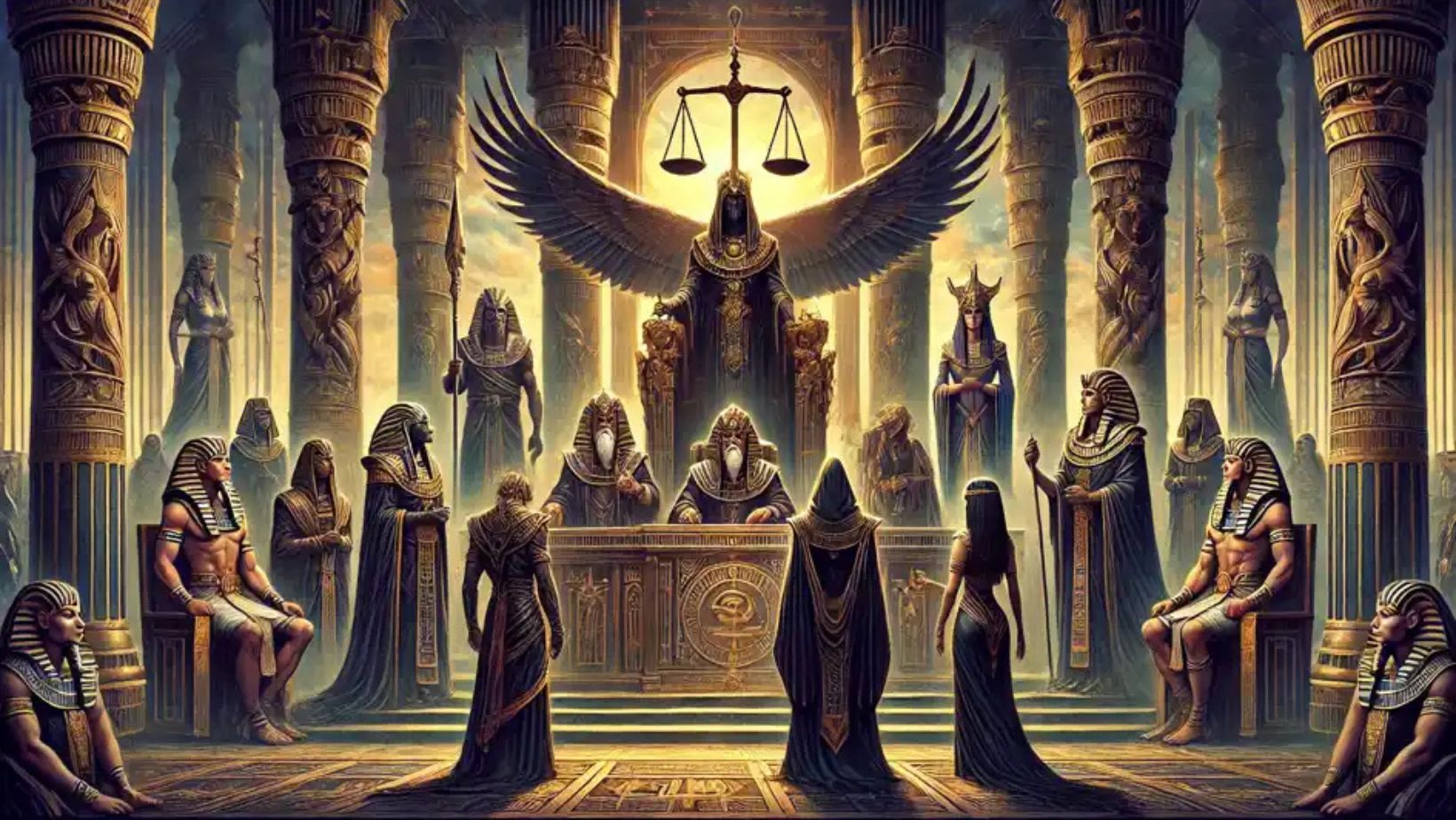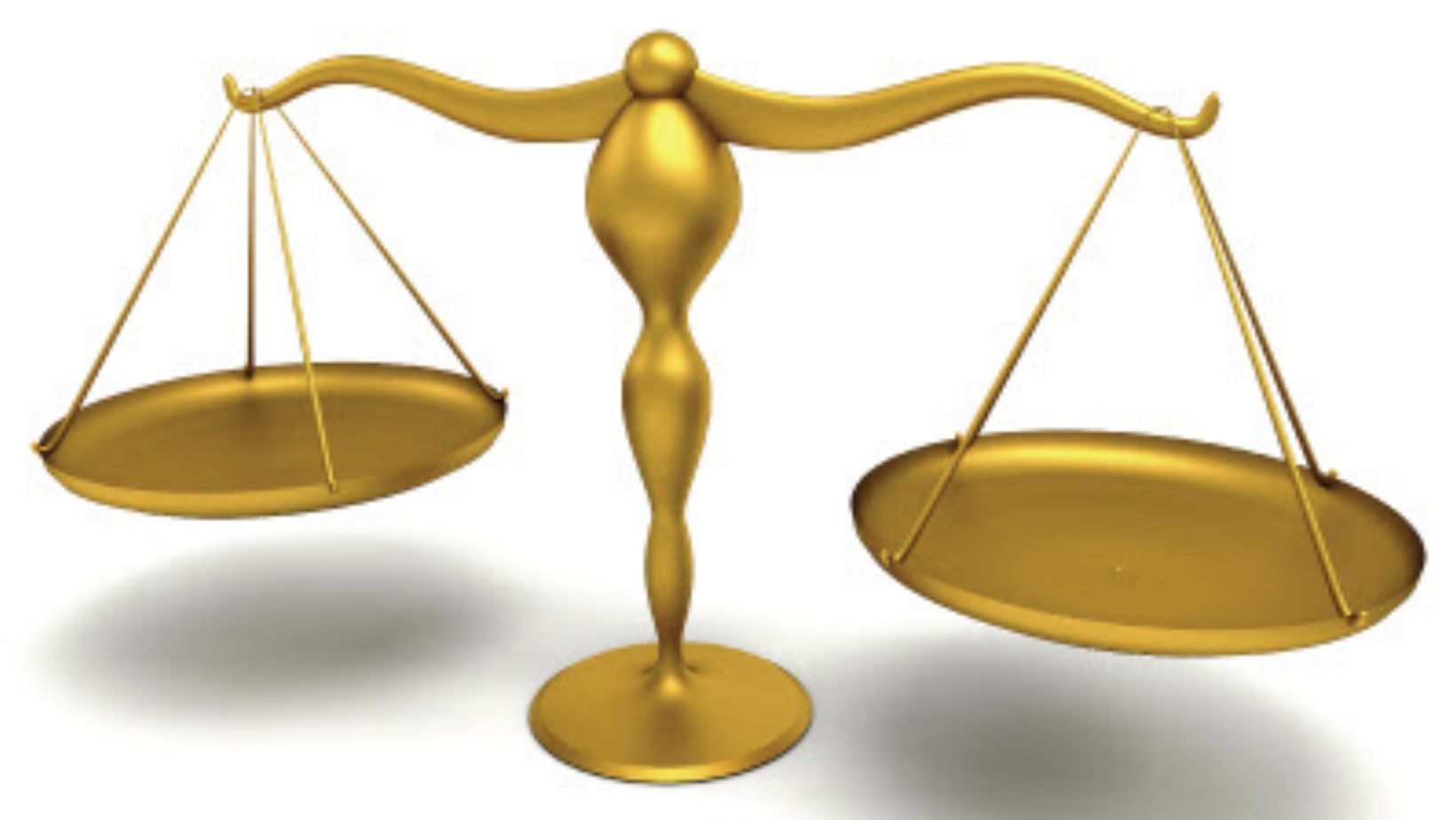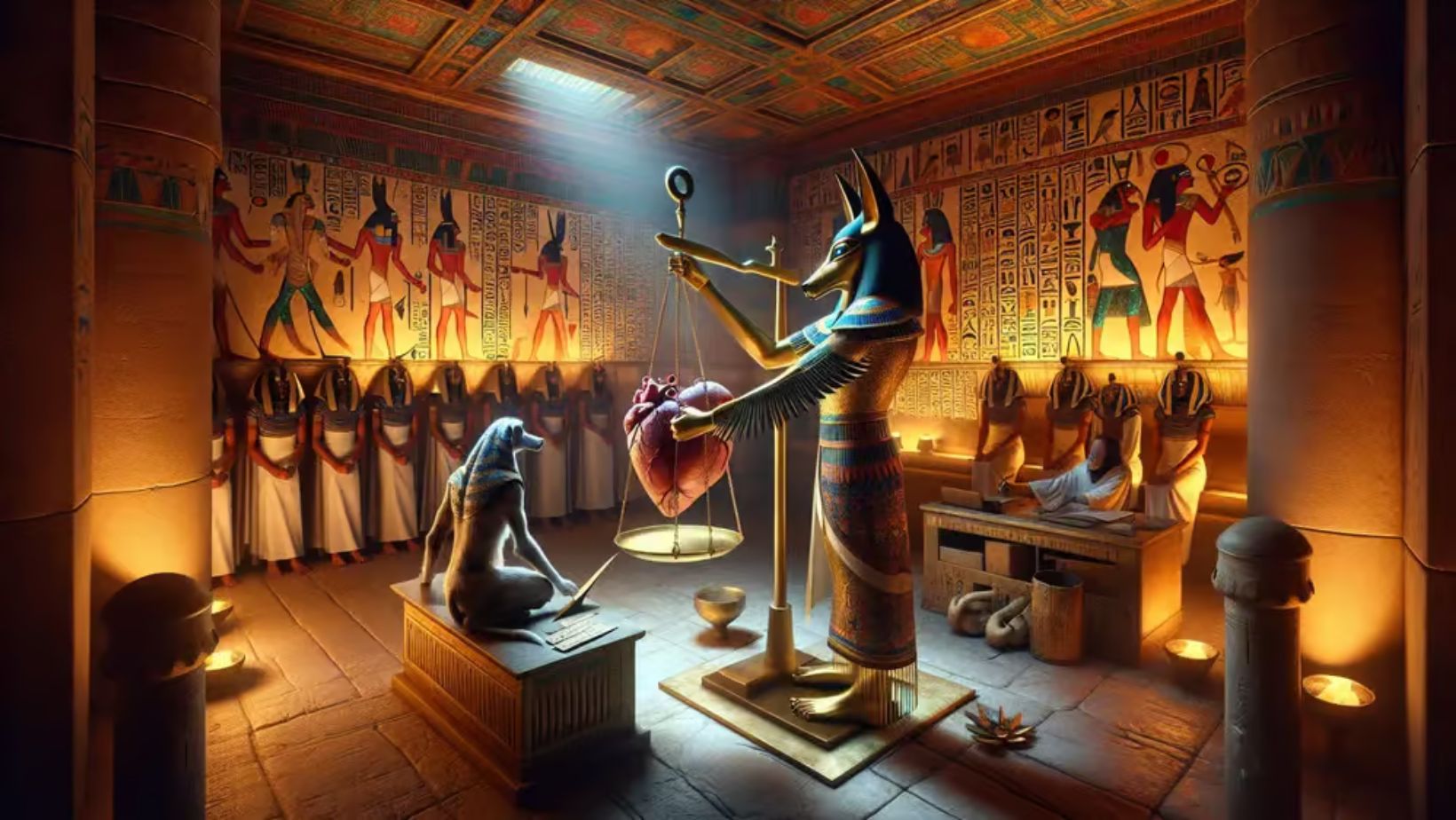In ancient Egypt, the heart was far more than just a vital organ—it was the center of one’s soul and identity. In Egyptian Beliefs, the heart held the key to one’s fate in the afterlife. When a person died, it was the heart that would be weighed against the feather of Ma’at, the goddess of truth and justice. This judgment determined whether the soul would be granted eternal life or devoured by the fearsome Ammit. The heart symbolized the moral and spiritual essence of the individual, making it central to the ancient Egyptian beliefs about life after death.
The Concept of Ma’at: Order and Justice in the Afterlife of Egyptian Beliefs

Ma’at is the ancient Egyptian concept of truth, balance, order, and justice. It represents the cosmic law that governs the universe, ensuring harmony in both the physical world and the afterlife. In Egyptian spirituality, Ma’at is embodied as a goddess, often depicted with an ostrich feather, symbolizing balance. The concept is central to maintaining order in society and the universe.
In the afterlife, Ma’at plays a crucial role in the judgment of souls. When a person died, their heart was weighed against the feather of Ma’at in the Hall of Two Truths. If the heart was lighter than the feather, the soul was deemed just and would be granted eternal life. If it was heavier, the soul would be devoured by the monster Ammit, resulting in obliteration.
Ma’at’s influence emphasizes the importance of living a righteous life. To live in accordance with Ma’at meant practicing truth, honesty, and fairness. The judgment based on Ma’at ensured that those who upheld these principles would be rewarded in the afterlife. Therefore, Ma’at is not just a concept of divine justice but also a moral guide for the living.
The Weighing of the Heart: An Ancient Ceremony and Egyptian Beliefs
The Weighing of the Heart is an important ritual in ancient Egyptian beliefs about the afterlife. In this ceremony, the deceased’s heart was weighed against the feather of Ma’at, the goddess of truth and justice. If the heart balanced with the feather, it meant the soul was pure and could enter the afterlife. If the heart was heavier, the soul would be devoured by Ammit, a fearsome creature.
Anubis, the god of mummification and the afterlife, played a vital role in this ceremony. He guided the soul of the deceased to the hall of judgment. Anubis oversaw the weighing process, ensuring it was conducted fairly. His presence symbolized protection and guidance for the soul.
After the heart was weighed, the deceased’s fate was decided. If found worthy, they were allowed to join the gods in the afterlife. If their heart was heavy with sin, they faced eternal punishment. This ritual emphasized the importance of living a virtuous life in ancient Egyptian culture.
The Heart vs. The Feather of Ma’at: A Symbolic Balance and Egyptian Beliefs
In ancient Egyptian mythology, the heart and the feather of Ma’at represent a profound balance of life and death. During the judgment of the dead, the deceased’s heart was weighed against Ma’at’s feather. The heart symbolized the soul’s purity, while the feather represented the principle of truth and justice. This process determined whether the soul could enter the afterlife.
The heart, believed to hold all the emotions and deeds of a person, was crucial in this judgment. If the heart was heavy with sin, it would tip the scale, and the soul would be devoured by Ammit, the devouring demon. However, if the heart balanced the feather, the soul was considered pure, allowing it to journey to the afterlife.
Ma’at’s feather was also a symbol of cosmic order, representing balance and harmony in both the physical and spiritual worlds. It stood for truth, justice, and purity, ensuring that only those who lived righteously could move forward. This balance, between the heart and the feather, reflected the ultimate measure of one’s life and actions.
Thus, the heart and feather symbolize the essential principles of life: living with integrity, truth, and moral purity. The balance between the two was a key to achieving eternal peace.
The Scale of Judgment: What Happens During the Weighing?

In many ancient cultures, the Scale of Judgment symbolizes the moment of truth for the soul. The concept often appears in mythologies, such as Ancient Egyptian beliefs, where the soul of the deceased was weighed against a feather of truth. The outcome of the weighing determined the fate of the soul in the afterlife. A balanced scale meant the soul was pure, while an imbalance could signify guilt or sin.
The scales represent the balance between good and bad deeds. If the soul was found lighter than the feather, it was considered virtuous and worthy of eternal peace. However, if the soul was heavier, burdened with wrongdoings, it would face punishment or destruction. This symbolic act demonstrates the importance of moral integrity in securing a favorable afterlife.
For many, the weighing of the soul offers a reflection on life choices and their consequences. It serves as a reminder that actions have weight, both spiritually and morally. The balance on the scales signifies the harmony between one’s actions and their ultimate judgment. It also highlights the universal theme of seeking balance and justice in the cosmic order.
The Role of Thoth: The Scribe of the Gods in Egyptian Beliefs
In ancient Egyptian mythology, Thoth was regarded as the scribe of the gods, responsible for recording divine decrees and actions. One of his key roles was during the Weighing of the Heart judgment, where he wrote down the results. In this judgment, a person’s heart was weighed against the feather of Ma’at to determine their fate in the afterlife. Thoth’s role ensured that the balance of justice was accurately recorded.
Thoth’s association with knowledge and wisdom made him an important figure in Egyptian culture. As the god of writing, he was credited with inventing hieroglyphs and serving as the patron of scribes. His wisdom extended to a vast array of disciplines, including science, mathematics, and medicine. Thoth was also believed to have the power to mediate between the gods and humans, offering guidance through his knowledge.
In addition to his role as the divine scribe, Thoth was also connected with the moon. He was often depicted with the head of an ibis or a baboon, animals symbolic of knowledge. His wisdom was seen as essential for maintaining order in both the heavens and the earth, reinforcing his role as a keeper of truth and balance.
The Divine Presence of Osiris: Ruler of the Afterlife in Egyptian Beliefs
Osiris was one of the most important gods in ancient Egypt. He was seen as the ruler of the afterlife, ensuring that the dead were judged and granted a place in eternity. As the ultimate judge, Osiris decided whether a soul was worthy of a peaceful afterlife or doomed to suffer. This judgment was a central theme in Egyptian beliefs about death and rebirth.
When a person died, their soul embarked on a journey to Osiris’ domain. They had to pass through various challenges, including the weighing of the heart against the feather of Ma’at, the goddess of truth and justice. If their heart was lighter than the feather, the soul was deemed pure and able to join Osiris in the afterlife. Osiris’ presence ensured the soul’s protection and guidance throughout this journey.
The role of Osiris as the afterlife ruler was linked to his own resurrection. After his death and resurrection, he became a symbol of life’s cyclical nature and immortality. Osiris represented hope, rebirth, and eternal life, giving comfort to the living and the dead alike. His divine presence reassured ancient Egyptians that death was not the end but a transformation into the next stage of existence.
The Fate of the Soul: What Happens if the Heart is Found Lacking?
In ancient Egyptian mythology, the judgment of the soul played a critical role in the afterlife. When a person died, their heart was weighed against the feather of Ma’at, the goddess of truth. If the heart was found to be heavy with sin, it failed the judgment. This meant the soul was unworthy of eternal life in the afterlife.
If the heart failed the test, the consequences were severe. The soul was not granted passage to the afterlife. Instead, it faced the terrifying devourer of souls—Ammit. Ammit, a creature with the head of a crocodile, the body of a lion, and the hindquarters of a hippopotamus, would consume the heart.
This act of consumption meant the soul would be destroyed. It would cease to exist, condemned to an eternal void. The judgment, therefore, was not just about moral integrity but about securing a peaceful afterlife. Failing it meant the soul’s eternal damnation, a fate feared by all ancient Egyptians.
The Soul’s Journey to the Field of Reeds in Egyptian Beliefs
The Field of Reeds, or “Aaru,” is the ancient Egyptian concept of paradise. It is the ultimate destination for the soul after passing the judgment in the Hall of Maat. This judgment, overseen by Osiris, determines whether a soul is worthy of entering the Field of Reeds. If the heart is found to be pure, the soul is granted eternal peace in this paradise.
In the Field of Reeds, the soul experiences an ideal afterlife, living in harmony with the gods. It is depicted as a lush, green place filled with abundant crops, peaceful waters, and eternal happiness. The soul is free from the suffering of the mortal world, living in a state of divine order. This afterlife is similar to the ideal life they once knew on Earth, only without hardship.
The Field of Reeds represents a reward for a life well-lived. The deceased person enjoys a peaceful existence, free from pain, and can even engage in activities they loved while alive. This journey to paradise reflects the ancient Egyptian belief in a just and balanced universe. It emphasizes the importance of morality and living according to the gods’ principles
The Importance of Heart and Deeds in Ancient Egyptian Culture

In Ancient Egyptian culture, the heart held great significance, representing the center of one’s soul and morality. Egyptians believed that after death, the heart was weighed against the feather of Ma’at, the goddess of truth and justice. If the heart was pure, the individual would pass into the afterlife, but if it was heavy with wrongdoing, the soul would be devoured by the goddess Ammit. This belief emphasized the importance of living a virtuous life.
The soul was central to Egyptian spirituality and influenced daily actions. Egyptians thought that a person’s deeds, both good and bad, would affect their fate in the afterlife. To ensure a favorable outcome, individuals focused on living with honor, fairness, and respect. This shaped their relationships with others, as morality was seen as essential for maintaining harmony in both the physical and spiritual worlds.
Personal virtue was closely tied to societal expectations. Kings and commoners alike were expected to uphold Ma’at, the concept of truth, justice, and cosmic order. This principle guided their laws, actions, and rituals, reinforcing a collective sense of moral responsibility. In this way, the pursuit of righteousness was not just personal but vital for the well-being of the entire community.
Conclusion: Egyptian Beliefs
The Weighing of the Heart was a central aspect of the ancient Egyptian judgment process, where the heart of the deceased was weighed against the feather of Ma’at, symbolizing truth and justice. This ritual reflected the Egyptian values of morality, balance, and accountability. The heart’s purity determined whether one would enter the afterlife, emphasizing the importance of living a virtuous life. The enduring legacy of this judgment is evident in Egyptian mythology, where it represents the eternal struggle for righteousness and harmony. It remains a powerful symbol of the Egyptians’ belief in the moral order of the universe.
FAQs
What is the significance of the Weighing of the Heart in ancient Egyptian beliefs?
The Weighing of the Heart ceremony is a central part of ancient Egyptian beliefs regarding the afterlife. It represents the judgment of the soul after death, where the heart of the deceased is weighed against the feather of Ma’at (the goddess of truth and justice). This determines whether the soul is pure enough to enter the afterlife or is devoured by the monster Ammit.
Who presides over the Weighing of the Heart?
The god Anubis, known as the god of mummification and the protector of the dead, is the one who conducts the Weighing of the Heart. He is shown as a jackal-headed figure, guiding the soul through the judgment process and ensuring the heart is accurately weighed.
What happens if the heart is found to be heavier than the feather of Ma’at?
If the heart is heavier than the feather, it indicates that the soul has been weighed down by sin or wrongdoings during its lifetime. In this case, the soul is condemned to be devoured by Ammit, a fearsome creature that is part crocodile, lion, and hippopotamus. This means the soul will face eternal destruction.
What role does the “Heart” play in ancient Egyptian beliefs?
The heart was considered the seat of the soul, intelligence, and emotions in ancient Egypt. It was believed to hold a person’s actions, thoughts, and deeds. Unlike other cultures where the soul might reside in the mind or spirit, the Egyptians believed the heart would speak for the deceased during the Weighing of the Heart ceremony.
How does the Weighing of the Heart relate to the concept of Ma’at?
Ma’at, the goddess of truth, justice, and order, plays a pivotal role in the Weighing of the Heart. Her feather symbolizes truth and balance, which the deceased’s heart must align with. The ceremony reflects the importance of living a just and balanced life, where one’s actions align with Ma’at’s principles, ensuring a favorable judgment in the afterlife.

